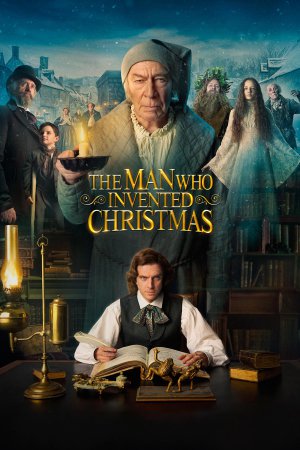
Keep Christmas in your own way, and let me keep it in mine
Once upon a time, there was a famous person, who made a famous piece of art, but get this: the famous piece of art was inspired by the events he experienced in his life. In other words, my friends, we have here yet another "Shakespeare in Love about _____" movie, with the blank this particular time being filled by the beloved 1843 novella A Christmas Carol. Admirably, screenwriter Susan Coyne, adapting a book by Les Standiford, had the restraint to avoid making The Man Who Invented Christmas a story about how Charles Dickens was a miserable skinflint before he was visited by ghosts, though there is an "It's Christmas Day! I haven't missed it!" sequence.
After a somewhat useless prologue centered around the author's first American tour, the film picks up in October 1843, with our boy Charles (played Dan Stevens; the role of Charles Dickens's hair is played by a truly alarming wig) having a professional crisis. After the monstrous success of The Pickwick Papers, Oliver Twist, and The Old Curiosity Shop, Dickens's has had three consecutive flops: Barnaby Rudge, the nonfiction American Notes for General Consumption, and Martin Chuzzlewit have all left audiences and some reviewers cold (at this point, Martin Chuzzlewit was only about halfway through its serialised publication; but shame on you if want good literary history from this movie). He can't come up with any ideas, but as he wanders around London, he starts picking up scraps of ideas from the people he meets, particularly one ice-cold sonofabitch (Christopher Plummer) who's the only mourner at the funeral of a wealthy businessman. He also has the good fortune to have a brand-new servant in his house, an Irish orphan named Tara (Anna Murphy), and her enthusiastically macabre tales help to capture his fancy. In hardly any time, the author is having vivid hallucinations of all the characters in his yet-untitled tale of Christmas charity, with the old asshole at the funeral reappearing in the form of the squeezing, wrenching, grasping, scraping, clutching, covetous old sinner Ebenezer Scrooge, and transcribing their words and acts in a frenzied act of composition that takes just six weeks.
The end result is the book that did, in fact, do more than probably any other single text to inform how the English-speaking world celebrates Christmas (I do not exclude the Christian New Testament from this estimate). Though if there's one thing curiously absent from this film titled The Man Who Invented Christmas, it's any bits where the man invents Christmas. Mostly, this is just an opportunity to re-run the same set of moral themes already present in the book - charity is better than greed, and the poor are poor because of misfortune and capitalism, not because of their moral failures - by positioning them within the context of Dickens's own life. And if there exists anyone who would, in 2017, go out of their way to watch a biopic of Charles Dickens, while remaining unaware that Charles Dickens spent his childhood in a workhouse, and had a lifelong hatred of the callous rich and governmental indifference to poverty as a result, I am sure that the film's twist ending where the above things are revealed would come as quite an amazing revelation.
I tease the movie. Only because it is drab and bad, you understand. There is nothing about the film that is surprising, and very little that is delightful other than Jonathan Pryce's slightly unhinged performance as Dickens's dissolute father John, a playful old fellow in the eyes of everyone but his angry and increasingly stressed-out son. And obviously, Christopher Plummer as Scrooge is such a faultless bit of casting that I'm only dumbfounded it took until 2017 for it to happen (I would very much like to see this happen in a proper version of the story, and not just one where Scrooge keeps making fun of Dickens and goading him into writing faster). Otherwise, it's just the same set of lies about the creative process, and the same ahistorical telescoping of events into a just-so chronology (one in which Queen Victoria invents the Christmas tree the same year that Charles Dickens invented Christmas); the same feeble attempt to add some shades of darkness to a beloved icon without making him actually unsympathetic (you would never know from this film that Dickens abandoned his wife, played by Morfydd Clark, later on, but you could at least gather that he ignored her a lot), and the same retroactive psychoanalysis that suggests the artist was only driven to create because of some childhood trauma. And it is, indeed, pretty easy to suggest that his father's imprisonment and his own subsequent time in a workhouse did fuel the rest of Charles Dickens's life and career; the notion that he wrote A Christmas Carol because a bully gave him a dead rat for Christmas one year is, to my knowledge, less well-attested by the biographers.
Mind you, I grouse and I complain, but really The Man Who Invented Christmas is quite harmless. There is very little reason to transmute the message of A Christmas Carol into another form when so many very good filmed adaptations of the book exist (and, to be fair, even more bad ones); I suppose there's some small pleasure to be had in seeing how the grind of being an author in mid-19th Century England looked, however filtered through the fanciful lens of paint-by-numbers drama. Stevens is a bit anachronistically pretty to play Dickens, or anybody else alive in 1843, but he's at least good at communicate the intense focus, verging on madness, that sufficiently sells the idea that when Dickens was in the throes of writing, he could be an enormous asshole to the members of his household. It is quite forgettable and quite mediocre, even at such basic things as putting together costumes that look like the clothes people wear when they're not on movie sets, but it is an overall very calming, pleasant mediocrity, and what is Christmas for if not being moderately entertained by vaguely uplifting movies?
After a somewhat useless prologue centered around the author's first American tour, the film picks up in October 1843, with our boy Charles (played Dan Stevens; the role of Charles Dickens's hair is played by a truly alarming wig) having a professional crisis. After the monstrous success of The Pickwick Papers, Oliver Twist, and The Old Curiosity Shop, Dickens's has had three consecutive flops: Barnaby Rudge, the nonfiction American Notes for General Consumption, and Martin Chuzzlewit have all left audiences and some reviewers cold (at this point, Martin Chuzzlewit was only about halfway through its serialised publication; but shame on you if want good literary history from this movie). He can't come up with any ideas, but as he wanders around London, he starts picking up scraps of ideas from the people he meets, particularly one ice-cold sonofabitch (Christopher Plummer) who's the only mourner at the funeral of a wealthy businessman. He also has the good fortune to have a brand-new servant in his house, an Irish orphan named Tara (Anna Murphy), and her enthusiastically macabre tales help to capture his fancy. In hardly any time, the author is having vivid hallucinations of all the characters in his yet-untitled tale of Christmas charity, with the old asshole at the funeral reappearing in the form of the squeezing, wrenching, grasping, scraping, clutching, covetous old sinner Ebenezer Scrooge, and transcribing their words and acts in a frenzied act of composition that takes just six weeks.
The end result is the book that did, in fact, do more than probably any other single text to inform how the English-speaking world celebrates Christmas (I do not exclude the Christian New Testament from this estimate). Though if there's one thing curiously absent from this film titled The Man Who Invented Christmas, it's any bits where the man invents Christmas. Mostly, this is just an opportunity to re-run the same set of moral themes already present in the book - charity is better than greed, and the poor are poor because of misfortune and capitalism, not because of their moral failures - by positioning them within the context of Dickens's own life. And if there exists anyone who would, in 2017, go out of their way to watch a biopic of Charles Dickens, while remaining unaware that Charles Dickens spent his childhood in a workhouse, and had a lifelong hatred of the callous rich and governmental indifference to poverty as a result, I am sure that the film's twist ending where the above things are revealed would come as quite an amazing revelation.
I tease the movie. Only because it is drab and bad, you understand. There is nothing about the film that is surprising, and very little that is delightful other than Jonathan Pryce's slightly unhinged performance as Dickens's dissolute father John, a playful old fellow in the eyes of everyone but his angry and increasingly stressed-out son. And obviously, Christopher Plummer as Scrooge is such a faultless bit of casting that I'm only dumbfounded it took until 2017 for it to happen (I would very much like to see this happen in a proper version of the story, and not just one where Scrooge keeps making fun of Dickens and goading him into writing faster). Otherwise, it's just the same set of lies about the creative process, and the same ahistorical telescoping of events into a just-so chronology (one in which Queen Victoria invents the Christmas tree the same year that Charles Dickens invented Christmas); the same feeble attempt to add some shades of darkness to a beloved icon without making him actually unsympathetic (you would never know from this film that Dickens abandoned his wife, played by Morfydd Clark, later on, but you could at least gather that he ignored her a lot), and the same retroactive psychoanalysis that suggests the artist was only driven to create because of some childhood trauma. And it is, indeed, pretty easy to suggest that his father's imprisonment and his own subsequent time in a workhouse did fuel the rest of Charles Dickens's life and career; the notion that he wrote A Christmas Carol because a bully gave him a dead rat for Christmas one year is, to my knowledge, less well-attested by the biographers.
Mind you, I grouse and I complain, but really The Man Who Invented Christmas is quite harmless. There is very little reason to transmute the message of A Christmas Carol into another form when so many very good filmed adaptations of the book exist (and, to be fair, even more bad ones); I suppose there's some small pleasure to be had in seeing how the grind of being an author in mid-19th Century England looked, however filtered through the fanciful lens of paint-by-numbers drama. Stevens is a bit anachronistically pretty to play Dickens, or anybody else alive in 1843, but he's at least good at communicate the intense focus, verging on madness, that sufficiently sells the idea that when Dickens was in the throes of writing, he could be an enormous asshole to the members of his household. It is quite forgettable and quite mediocre, even at such basic things as putting together costumes that look like the clothes people wear when they're not on movie sets, but it is an overall very calming, pleasant mediocrity, and what is Christmas for if not being moderately entertained by vaguely uplifting movies?






